Full story at BRIGHT Magazine
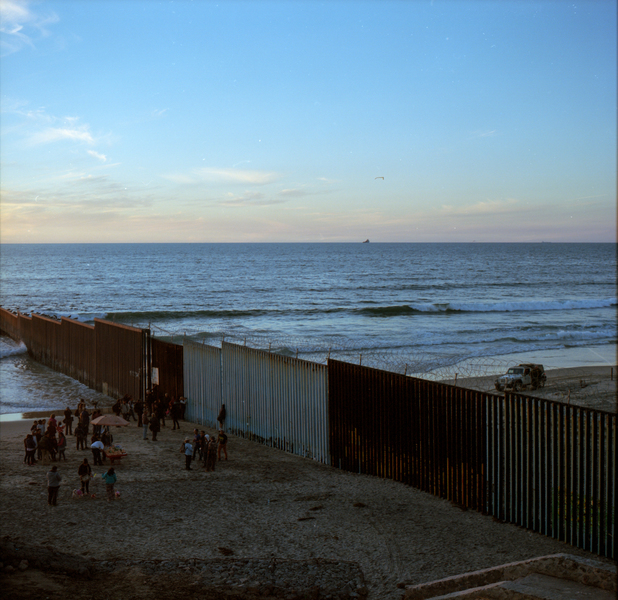
People gather and look through the US-MX border fence from Tijuana's Friendship Park after three people allegedly broke through the fence and crossed through to the US side, immediately apprehended by US Border Patrol. Border Patrol agents stand with their jeep on the US side of the border, watching the crowd. Meghan Dhaliwal 2018
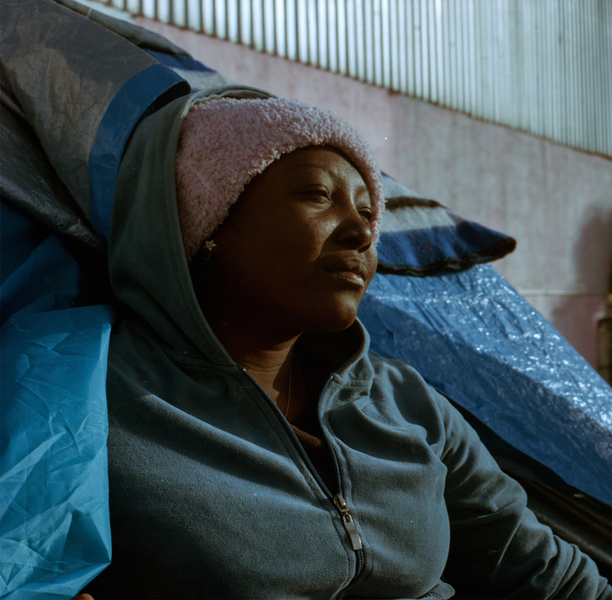
Paola Mauricio, 30, of Honduras is here because the combination of violence and lack of work in her home country made her feel like she couldn't stay. "I'm just looking for a better life," she says--a familiar answer. In Honduras, a gang member wanted her to be their girlfriend, and then when she declined he threatened to kill her. "The caravan hasn't been so bad, the Mexican people have really helped us a lot." She plans on waiting to apply for asylum here in Tijuana, and applying for papers to work in Mexico in the meantime. Meghan Dhaliwal 2018
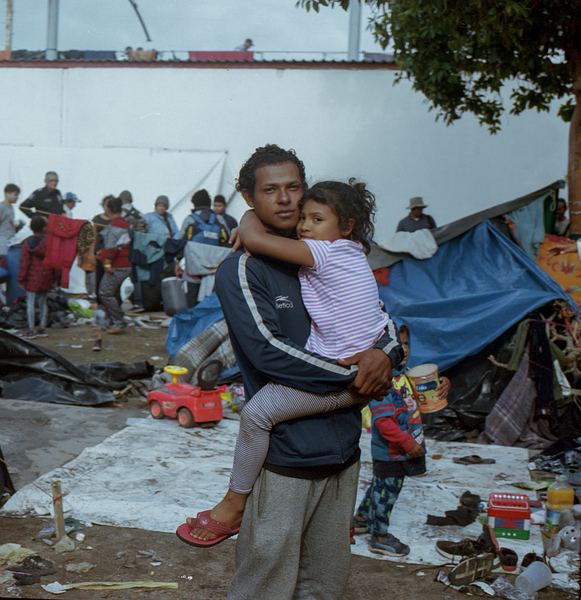
Ronan Ivan Diaz, 25, of Honduras holds his seven year old daughter Keiry in the Benito Juarez camp in Tijuana where thousands of members of the caravan of Central Americans are being housed. "I left Honduras because there was no work." He and his wife had been traveling with their two young children but his wife decided to go back to Honduras from Tapachula. He hopes to cross to the US with his two children, hopes to get asylum for them and then a steady job. "There is no opportunity for anything in Honduras." Meghan Dhaliwal 2018
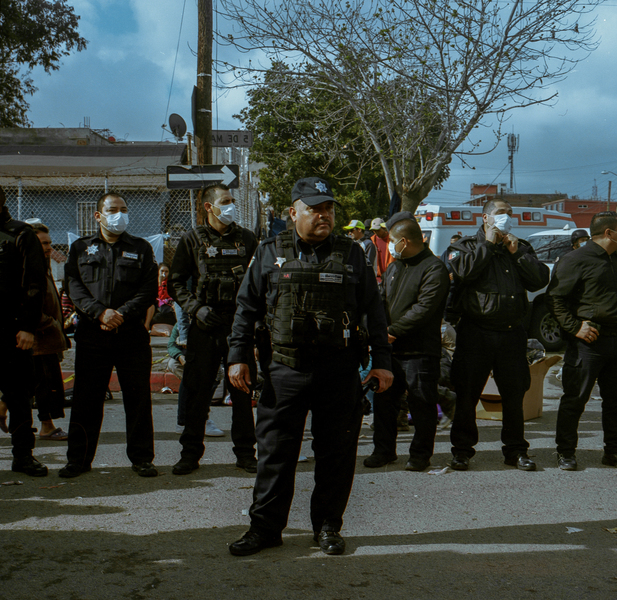
Mexican police stand outside the Benito Juarez shelter in downtown Tijuana as members of the caravan move by bus from Benito Juarez to the new shelter, Barretal, on the outskirts of the city. Meghan Dhaliwal 2018
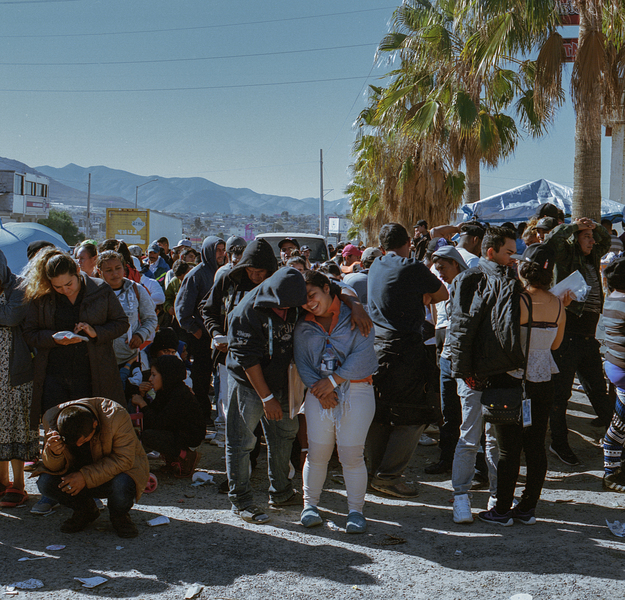
A line of people form in front of the Barretal shelter in Tijuana, waiting for buses to take them downtown so they can apply for papers to work in Tijuana. Many people are resigned to being in Tijuana for a while, with the list of asylum seekers at the port of entry exceeding 5,000. Meghan Dhaliwal 2018
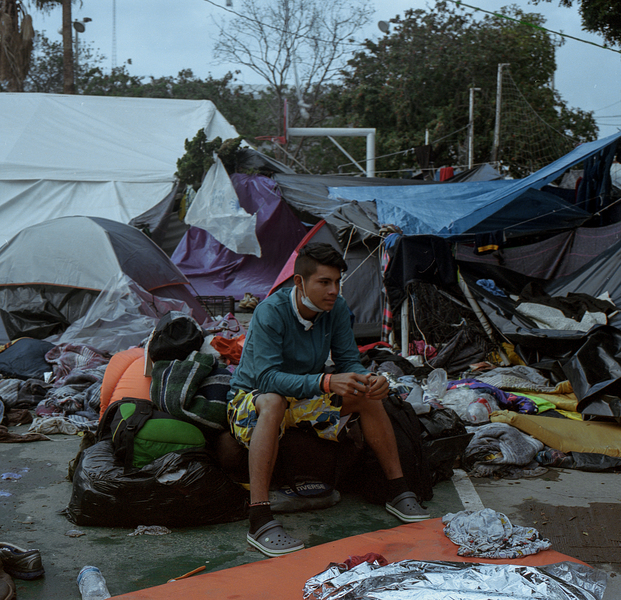
Dennis Daniel Amaya, 18, of Honduras sits on a pile of belongings, waiting for the rest of his friends so that they can move out of their current shelter--Benito Juarez, in downtown Tijuana. Heavy rains flooded the camp and made living conditions unhealthy. He insists he isn't sick as he sniffles through talking, much of the camp coughing and sneezing from being exposed to heavy rains with limited shelter. "There just isn't any work in Honduras. A lot of us came because of that." He's traveling with his brother and his cousin, but the rest of his family remains in Honduras. "I just want to find work and help my family back there." Meghan Dhaliwal 2018
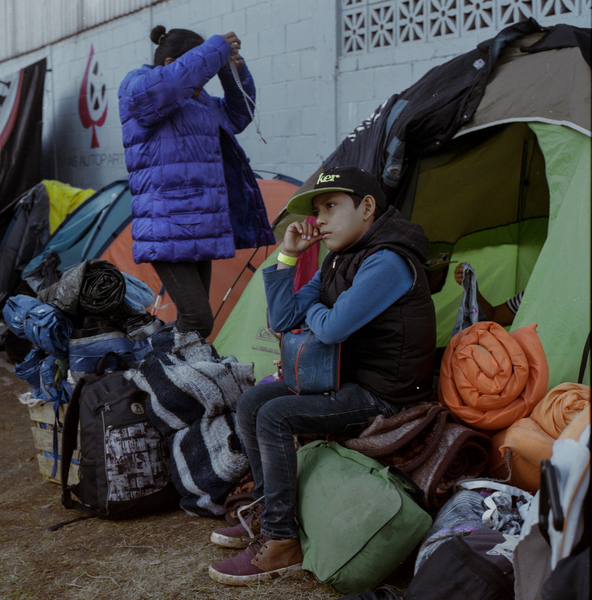
Saul Alvaringa, 9, of El Salvador sits on his family's luggage of sleeping bags, blankets and a few pairs of donated clothes. When asked about the journey, his serious face turns sheepish and he smiles shyly: "It's been really, really long." Meghan Dhaliwal 2018
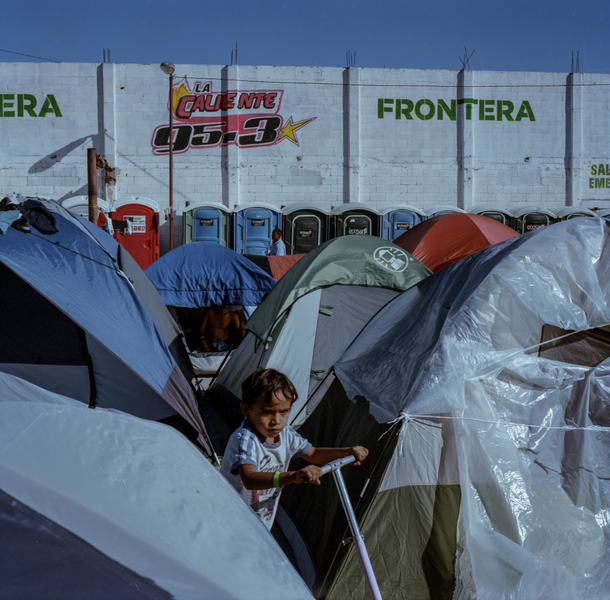
Tents, people, port-o-potties sit tight in the Barretal shelter, the word "Frontera" or "Border" looming above every head. Meghan Dhaliwal 2018
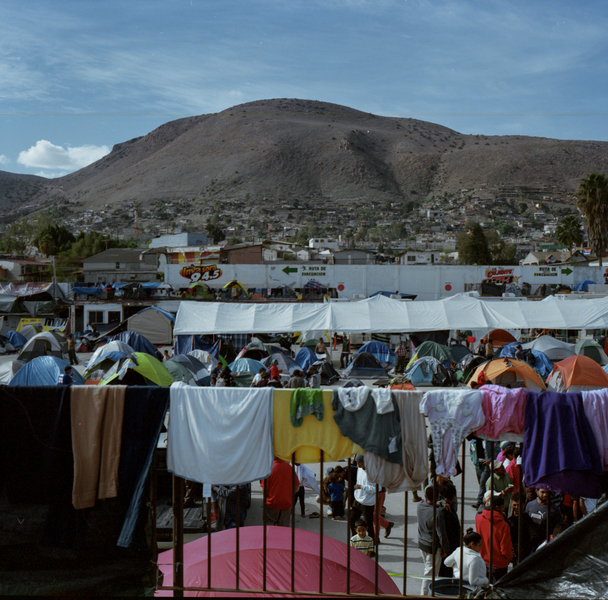
Clothes dry on a railing at the Barretal camp in Tijuana. Meghan Dhaliwal 2018
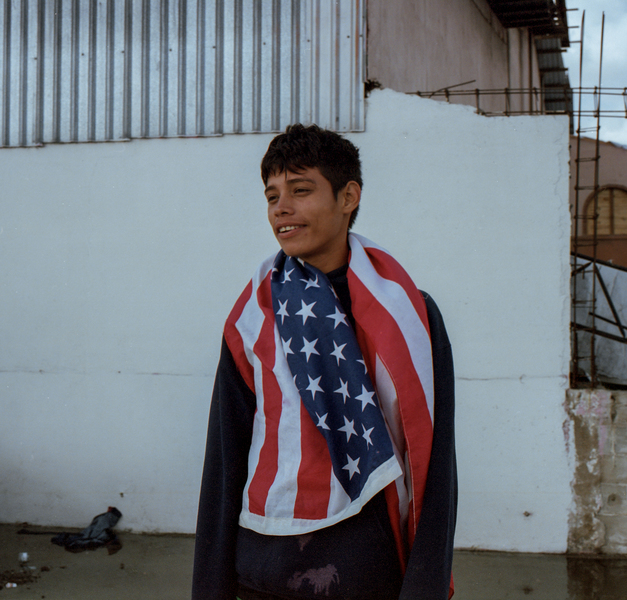
Daniel, 19, stands on a ledge at the Barretal camp that currently houses approximately 2000 members of the caravan of people that arrived from Central America to Tijuana weeks ago. "I left home because there was no work, I left home so that I could move my family forward." He made it Tijuana but doesn't think now is the time to try to cross to the US--he'll stay in Mexico for the time being. But his dream is to someday live in California. When asked about the American flag around his neck, he shrugs: "The truth? I'm so cold." Meghan Dhaliwal 2018 *asked for last name to be withheld
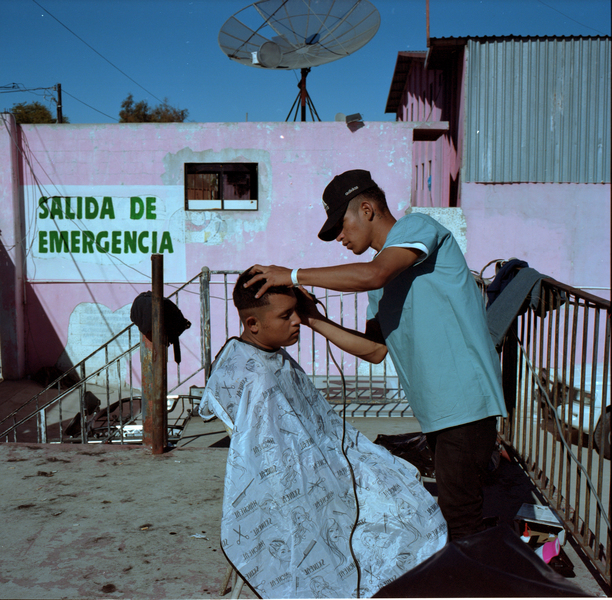
Daniel Villafranca, 19, of Honduras cuts hair at the top of the stairs at the Barretal shelter. Men and boys line up to have their hair done by him, like 15 year old Kevin Mendez. "I like having something to do," says Villafranca. Meghan Dhaliwal 2018

Leonel Melendez, 22, of El Salvador lays in his tent that he shares with two other people, smoking a cigarette and looking at himself in a hand mirror. "I had to leave El Salvador because of discrimination, because I'm gay," he says. "I even had to take my rainbow bracelet off while I'm here in the camp. People here will discriminate too." His dream is just to have a normal life--a home, a partner and a family. Meghan Dhaliwal 2018

Marta Alicia Martinez Padilla, 26, sits in her tent with her husband and two sons, ages 8 and 6, all from Guatemala. "We left because of economic and personal problems." Marta's mother was assaulted, and when the family tried to file a report, he threatened the two boys. "We had to leave to find a better future for them." The family wants to apply for asylum, but waiting in a tent for potentially months is problematic with two young boys. "We have a number, 1387." But they are thinking of trying to cross the wall, having gotten close but caught by Mexican police. "I do not know whether to leave or wait for the number." Meghan Dhaliwal 2018

Josué Natanael Marroquin Orellana, 24, from Honduras and Elida Armi Quintanilla, 29, from El Salvador met on the caravan and struck up a romance in Huixtla. "I'm here because it is so difficult in my country," says Josué, "there is no work. No money." Elida chimes in, "It is the same in El Salvador. You work from 4am to 5pm for three dollars a day." Josué left his brother and mom behind in Honduras and Elida her two children. "I just want to work enough to support my children in El Salvador. I want to work for some time in the US and then I want to go home. I miss everything about my country, my family, my home," says Elida. Meghan Dhaliwal 2018

Clothes and shoes dry at the Barretal camp in Tijuana. Meghan Dhaliwal 2018

Jessica Perez (center), 18, of El Salvador holds her six month old son Giovani. She's traveling with her husband's family, leaving her own family behind in El Salvador. "We're just looking for a better life...there is a lot of crime in our country. A lot." Her husband, Israel, was targeted by gangs after he refused to join them. They hope to apply for asylum in the US, but for now plan on staying in Tijuana for a little while. Meghan Dhaliwal 2018

Gabriella Panameño Palma, 24 of El Salvador smokes a cigarette while having her hair done by volunteers. Yesterday was her 24th birthday. "Honestly I joined the caravan, the second caravan, because it is an adventure. I don't miss my country, but I miss my mom." She says El Salvador is entrenched in sexism and that finding work is hard. "There are no chances for you if you're a woman." She wants to see how Tijuana is, and is entertaining the idea of staying here. But if not, she says, she'll see if she can cross to the US. Meghan Dhaliwal 2018

A child helps set up a tent at the Barretal shelter in Tijuana Meghan Dhaliwal 2018
![Daniel, 18, of El Salvador stands outside of the Benito Juarez camp where the caravan stayed when they first arrived to Tijuana. In El Salvador, he was being pressed to join a gang, so when he heard about the caravan he knew this was his chance to get out. He thought seriously about crossing the fence, not ready to wait the months alone in Tijuana waiting for his asylum number to be called (he doesn't even have one yet), but now he feels unsure. "I want to go talk to the lawyers [that are volunteering their time to talk to members of the caravan] and see what my options are." He's picked up a few odd jobs in Tijuana and made friends with a few other 18 year old Salvadoreños in the caravan. He's worried about moving to the new shelter on the outskirts of Tijuana where the majority of the caravan is staying--it is too far from the border.
Meghan Dhaliwal 2018](/images/tmp.png)
Daniel, 18, of El Salvador stands outside of the Benito Juarez camp where the caravan stayed when they first arrived to Tijuana. In El Salvador, he was being pressed to join a gang, so when he heard about the caravan he knew this was his chance to get out. He thought seriously about crossing the fence, not ready to wait the months alone in Tijuana waiting for his asylum number to be called (he doesn't even have one yet), but now he feels unsure. "I want to go talk to the lawyers [that are volunteering their time to talk to members of the caravan] and see what my options are." He's picked up a few odd jobs in Tijuana and made friends with a few other 18 year old Salvadoreños in the caravan. He's worried about moving to the new shelter on the outskirts of Tijuana where the majority of the caravan is staying--it is too far from the border. Meghan Dhaliwal 2018

Phones charge from an extension cord at the Barretal camp in Tijuana. Meghan Dhaliwal 2018